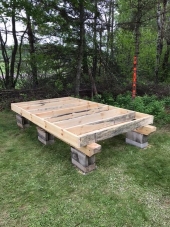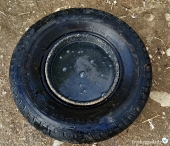
 2
2




A build too cool to miss:Mike's GreenhouseA great example:Joseph's Garden
All the soil info you'll ever need:
Redhawk's excellent soil-building series









Joy to You
 6
6




Visit Redhawk's soil series: https://permies.com/wiki/redhawk-soil
How permies.com works: https://permies.com/wiki/34193/permies-works-links-threads

 2
2




 4
4




Jay Angler wrote:My physics expert on freezing temperatures and salt water says this won't work:
1. Yes, salt water freezes at a lower temperature than fresh water - we live by the ocean and we use brine bottles to fast freeze our chickens when we process them, so we've had experience in that area.
2. However, the chickens aren't drinking the salt water - they're drinking the surrounding fresh water.
3. Water is an energy hog - if the bottle of salt water is put in at "lukewarm", it will release it's energy to the surrounding fresh water which will slow down the speed at which the fresh water freezes. This is why "electric water bowl heaters" exist for farm animals. However, once the heat is gone, the water will start freezing usually by crystalizing at the edges. As the fresh water "changes phase" from liquid to solid, this releases a lot of energy which will slow the rest of the water from freezing, but given time, it will freeze.
4. If we're expecting below freezing weather, we will take jugs of hot water to the chickens and substitute it for the already starting to freeze water in their buckets at bedtime. This will slow the process, and hopefully there will still be a few pockets of unfrozen water in the morning and that the chickens can peck through the icy surface to get to them.
5. Although we use the type of waterer shown in the video for some of our birds in the warm months, in the winter we use a rubber bucket as these aren't damaged by freezing and are easier to get the ice out of.
Possibly for the fellow in the video, the density of chickens in the hen house were keeping the temperature higher than he thought. Alternatively, if the hay mulch is deep enough, he may be getting decomposition which is heating the waterer from below. He certainly has plenty of hay bales as insulation around him in the video. Using a composting deep mulch system under the hens would be a more reliable way to keep the water from freezing than using a brine bottle from our experience.
A build too cool to miss:Mike's GreenhouseA great example:Joseph's Garden
All the soil info you'll ever need:
Redhawk's excellent soil-building series





 1
1




Christopher Weeks wrote:That's pretty awesome -- the bottle of brine acts as a cold-sink, continually giving up calories that keep the energy state of the drinking water higher than it otherwise would be. Trace, I hope you report back how it works and how it changes your water-swapping schedule when things get chilly.





 2
2




Trace Oswald wrote:5. A good idea. Do you have to do something to keep the chickens from getting in the bowl? Or they just stay out of it?

Visit Redhawk's soil series: https://permies.com/wiki/redhawk-soil
How permies.com works: https://permies.com/wiki/34193/permies-works-links-threads
 2
2




Visit Redhawk's soil series: https://permies.com/wiki/redhawk-soil
How permies.com works: https://permies.com/wiki/34193/permies-works-links-threads
 2
2




Jay Angler wrote:If one could come up with a way to insulate the sides and most of the top of the bucket, that would slow down how quickly warm water would cool and freeze. The problem is that I can't think of a good way to do that without making a mite/lice haven, a microbe collection point, or it be something the chickens would peck at and eat. I tried a scrap of styrofoam on top once, but apparently, chickens like styrofoam... I do *not* like my chickens eating it, even if they do like it!
If I was as cold a climate as Trace is describing, I'd be considering 2 layers of pond-quality EDPM with insulation in between and the special EDPM glue/tape to seal the two layers together.
Or maybe consider a wooden box like is used for a bucket toilet, partly insulated and with a partial cut-out large enough for generous space for a chicken's head? If you've got a rooster, make it even bigger for their comb? Either have the top hinged, or simple lift the whole box off to retrieve the bucket, if the box isn't too heavy. It would be hard to justify the effort with my climate, however, it would also solve the problem of buckets being tipped over!
Permaculture...picking the lock back to Eden since 1978.
Pics of my Forest Garden
 2
2




Maybe they do - sort of. Picture the product below with the lid unscrewed so the chickens can drink from the top!Greg Martin wrote:It would be great if the manufacturer made this with skinned microfoamed walls. Would save them money on plastic, lighten the product and make it more insulative without much loss of strength....too bad they didn't!
![Filename: insulated-water-jug-for-chickens.jpg
Description: [Thumbnail for insulated-water-jug-for-chickens.jpg]](/t/190712/a/188137/insulated-water-jug-for-chickens.jpg)
Visit Redhawk's soil series: https://permies.com/wiki/redhawk-soil
How permies.com works: https://permies.com/wiki/34193/permies-works-links-threads




"When the whole world is running towards a cliff, he who is running in the opposite direction appears to have lost his mind." C.S. Lewis
Visit https://themaineingredient.com for organic, premium dried culinary herbs that are grown, processed, and packaged in the USA.
 3
3




 3
3




"When the whole world is running towards a cliff, he who is running in the opposite direction appears to have lost his mind." C.S. Lewis
Visit https://themaineingredient.com for organic, premium dried culinary herbs that are grown, processed, and packaged in the USA.

|
Watchya got in that poodle gun? Anything for me? Or this tiny ad?
Learn Permaculture through a little hard work
https://wheaton-labs.com/bootcamp
|



